Healthy People Equal Healthy Forests
Air Date: Week of November 1, 2019
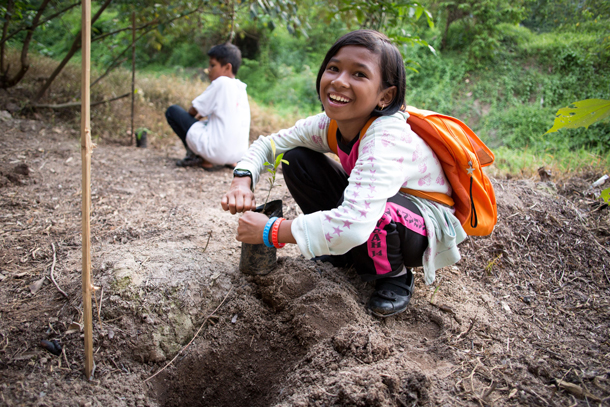
A young girl plants a seedling at the ASRI clinic in Gunung Palung National Park. (Photo: Chelsea Call)
Gunung Palung National Park on the island of Borneo is home to diverse species found nowhere else, and beloved by the people who live on the Indonesian island. But like many people who live near tropical forests, they have at times had to resort to illegal logging to pay for healthcare. Now the nonprofit Health in Harmony is providing healthcare that patients can pay for with a simple trade of labor, seedlings or manure, so that no one ever has to log to pay cash for essential health services. Founder Kinari Webb and Host Bobby Bascomb discuss the importance of listening to what forest communities say they need in order to stop logging.
Transcript
[SFX SOUNDSCAPE FROM BORNEO UNDER LEAD]
BASCOMB: The rainforests of Borneo are some of the oldest tropical forests in world, roughly 130,000 years old. And because they evolved on an isolated island the forests are teeming with endemic species found nowhere else on earth. From highly endangered orangutans, tigers, and rhinos to pygmy elephants just five feet tall. Borneo’s Gunung Palung National Park is a critical habitat for many of the island’s endangered species and a huge carbon sink – crucial in our fight against climate change. The rainforest was also being deforested at an alarming rate when Kinari Webb first visited in the early 90’s. Kinari was a student at the time but she was so alarmed by the deforestation she saw that she went on to found the nonprofit Health in Harmony, which aims to keep the forest healthy by keeping people healthy and she joins me now to explain. Kinari Webb, welcome to Living on Earth!
WEBB: Thank you so much. It is such an honor to be here.
BASCOMB: So first of all, tell me about Gunung Palung National Park in Borneo and the relationship that these communities have with the forest there.
WEBB: So I first went to Borneo when I was an undergraduate. I took a year off and spent a year deep in the rainforest studying orangutans. And Gunung Palung National Park is considered the jewel in the crown of all the Indonesian national parks. It is just the most beautiful place I've ever been on Earth. And what's really interesting is that the communities surrounding the park, there's a lot of people who live right around the park, about 60,000 people. They love the forest as well. They consider it their mother and they understand that their well-being comes from the forest, because, largely because of water, but they also talk about, you know, if you go up into the forest and you log, you push disease down into the communities. And they understand kind of in a spiritual way too, if you log the forest, that might also make you sick just by disturbing the forest herself.
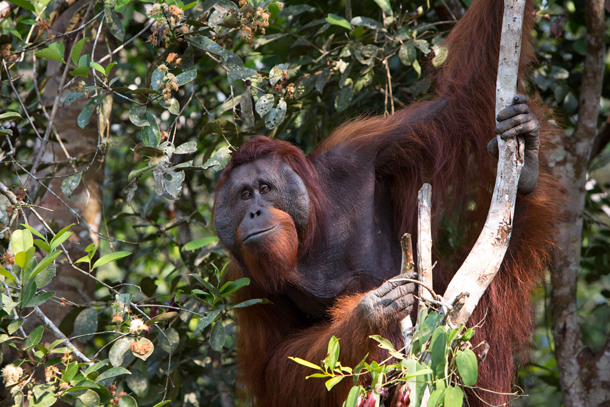
An orangutan in Indonesian Borneo. Kinari Webb was studying orangutans in Borneo in the early 1990s when she found out that much of the logging there was done so locals could cover health care costs. (Photo: Chelsea Call)
BASCOMB: And so how did you come to this idea of providing health care for people as a way to reduce deforestation?
WEBB: So what's really interesting is you look at this situation where the communities really love the forest, they honor and respect it, and they want it to be there for future generations. But the logging was rampant, it was completely out of control. And when I first went there, it was like the forest stretched to the horizon. And then it was just shrinking and you could hear the chainsaws all the time. And at first, I was just so angry at these people. But then I realized, and I talked to many of them, and what they told me was, you know, if my child is sick, or my family member is sick, I have no choice and it's one of the only ways to get cash. At another national park where we recently just started working, one woman told me, if anyone ever tells you that they have not logged to pay for health care, they are lying to you. Because there is no other way to get that much money, and one medical emergency can cost an entire year's income.
BASCOMB: Wow.
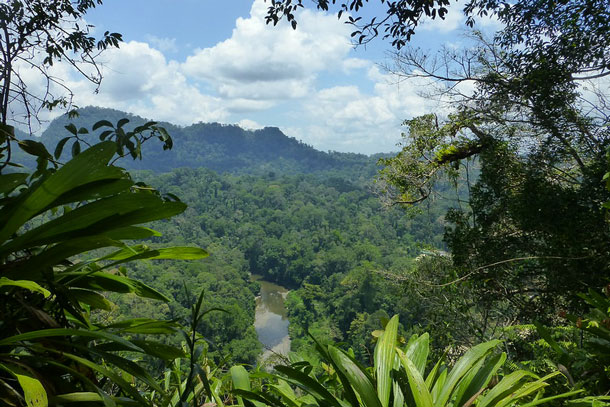
The forests of Indonesian Borneo. (Photo: Andy Nelson, Flickr CC BY-NC 2.0)
WEBB: So that just was like, that just broke my heart. How can that be? And how can we be allowing that to be? So I ended up going to medical school and returning to Indonesia so that I could try to work on this intersection between human and environmental health.
BASCOMB: You call it radical listening, the way that you discovered what these people need and how to help them. Can you tell me more about that?
WEBB: Yeah, you know, it's funny, I call it radical. The reason that I call it radical, even though it's truly just listening, is because we actually do what people say. And that is wildly unusual in the way that development is done and conservation is done. And it's sad that it's unusual, but it is very, very unusual. And so we just sit in a circle with a group of people, you know, about usually about 50 people, something like that. Men and women, leaders and just normal folks from the community. And we ask them, what would you all need as a thank you from the world community so that you could actually protect this precious forest that you all are guardians of? And it was amazing because every single community and everywhere we’ve been, it's been the same, that every community will independently come to a solution that is the same in a given region. So around Gunung Palung it was we need access to healthcare, and we need training and organic farming. And if we have those things, we can stop logging. Now, I just, in the beginning, I just trusted on faith that they truly knew what the solutions were. But 10 years later, we had incredible data that showed a 90% drop in logging households; a stabilization of the loss of primary forest, which had been shrinking like crazy. We had a re-growth, actually, of 52,000 acres of forest, and we had a 67% drop in infant mortality. So this was like this true win-win. And they knew the most efficient and effective ways so that they could do what they wanted to do, which was protect the forest.
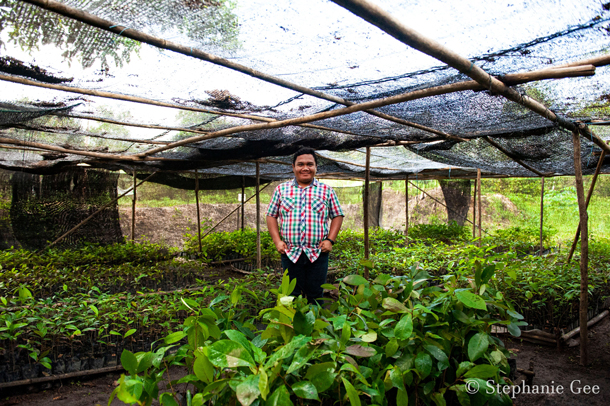
ASRI Director of Conservation Programs Dika stands in a seedling nursery. ASRI is the Indonesian sister nonprofit to Health in Harmony. (Photo: Stephanie Gee)
BASCOMB: It's amazing. I mean, it does ring true to me that, you know, I think a lot of NGOs will go to a community and say, Oh, you need a school, or you need a road. But if you actually stop and ask people, they might say, we need water. We need sanitation. And sounds like that's what you found there.
WEBB: Right? Yeah.
BASCOMB: Well, what kind of healthcare did people have there traditionally, and what does Health in Harmony provide?
WEBB: So when we first started in 2007 in these communities, there was a little government clinic; rarely had a doctor, and the system was not ideal, let's just say. So we ended up starting a little clinic, getting an ambulance, doing mobile clinics. We've now seen over 90,000 patient visits. We ended up providing a kind of simultaneous to the government healthcare system, when the government was struggling to get a system that was quite functional. And since then they have done a much, much better job. And we coordinate with them all the time, and I think that together, we have really made a great difference in these communities. And one of the heads of the Department of Health at one point said to me, he said, You know, I didn't even know it was possible to provide high quality health care in a remote area. It wasn't even trying until I saw your clinic.
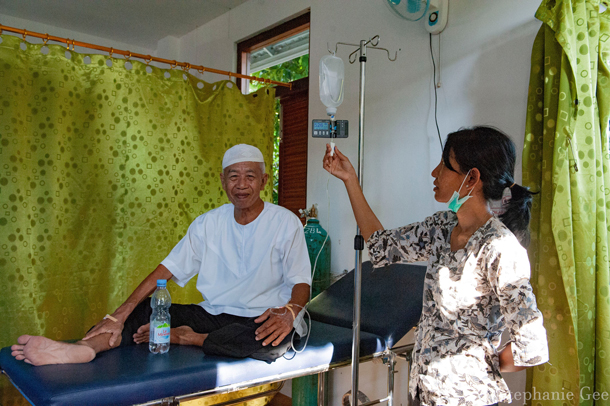
A patient is treated at the medical clinic at ASRI. (Photo: Stephanie Gee)
BASCOMB: And how do you make it affordable for people?
WEBB: So this is, this is sort of where it gets creative. We actually allow people to pay with non-cash payment options. We don't want anyone to ever have to log to pay for health care. So they can pay with seedlings; they can pay with manure, actually, that we use for the organic farming training; they can pay with labor. And these are very popular. Last year, we collected 18,000 seedlings from patients. But we also do another thing, which is that we give community-wide discounts to villages that are based on the amount of logging. So no logging at all, and they get a 70% discount in the clinic. And that discount is paid for by folks from all around the world, people like you, who want to say thank you to them for protecting this precious rainforest that's incredibly valuable to the whole world.
BASCOMB: And I saw your TED talk, you talk about taking American doctors who just want to give back or have an experience working in the developing world, to train your doctors there in Indonesia, or you take experts in agriculture from other parts of Indonesia and bring them to Borneo and do training there on the ground. Can you tell me how those partnerships work?
WEBB: Yeah, so like, I sometimes joke that what is needed in one place in the world just happens to be excess and another place in the world. So the communities needed, you know, and this is what they said, that we need high quality healthcare. So we hired young doctors from Indonesia who had just recently finished medical school, and then we trained them with doctors from the US who would come in free of charge loving this experience, getting to come, see the rainforest, and teaching and of course learning from these young doctors as well. And so that's been very successful. And then when we needed experts in organic farming, the next door island of Java has a many thousand year tradition in sustainable agriculture. So it was easy for us to bring in folks.
BASCOMB: And that's something that people told you that they wanted, was more training in organic farming. Can you tell me about that?
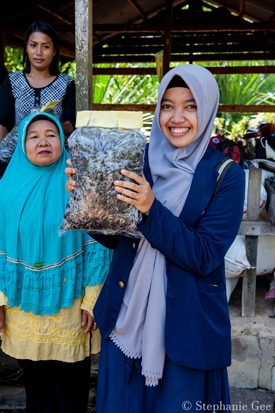
Members of the community are trained in organic and sustainable farming. (Photo: Stephanie Gee)
WEBB: Yeah, it's like so weird, right? I was very, very surprised when people asked for that. I thought, why don't you just talk to your grandparents? But they said no, no, the traditional form of agriculture here is slash and burn, right. And, and so they had some wet rice fields, because they had, they said, look, that system just isn't working anymore, there used to be so much forest and not many people. And it's just not like that anymore. So they said we know that we have to plant in one place, but the only way we know how to do that is with very expensive chemical fertilizers and we just can't afford them. And what was really interesting is that in our five year anniversary party, one of the village chiefs said that many of the former loggers had now become farmers because they didn't need startup money for chemical fertilizers, they could just make their own fertilizer. And, you know, that was one of those sort of like multi layers of why they asked for that solution that, as an outsider I would have never seen.
BASCOMB: And so what were your results? What was the rate of deforestation before you started this program and what is it today?
WEBB: So we started with about 1,350 logging households based on a baseline survey, and then after five years that went down to 450. And then after 10 years, it was down to 150 loggers. That's a 90% drop.
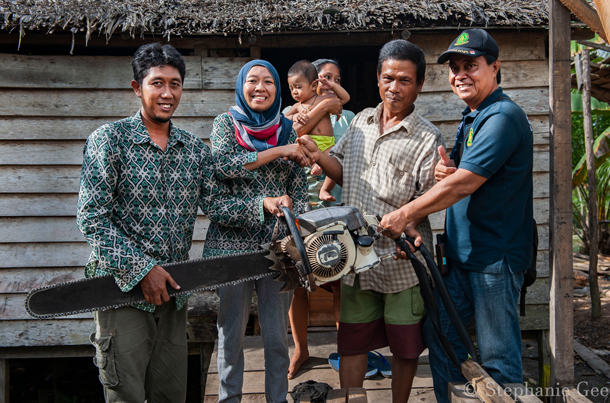
Local Pat Karim sells his chainsaw as part of the Chainsaw Buyback Program, wherein Health In Harmony buys and retires the chainsaws of local loggers and supports them in development of alternate forms of occupation. (Photo: Stephanie Gee)
BASCOMB: Wow.
WEBB: Now, since then, it's actually gone down even more because those last remaining 150 loggers, they are kind of the hardcore folks. They tended to be people who didn't own their own land, which is very unusual in that region. And they tended to own their own chainsaws, which is a huge, huge investment. So we actually started this program called a chainsaw buyback, where it's kind of like angel investing. We give them some money to start a small business, and they also put in money, but the money that they put in is their chainsaw, which we buy from them. And then they started these small businesses, which have been wildly successful. And I think it's mostly because people just didn't have the startup money. I talked to one guy who started a little chicken business, and in his community of 10,000 people, they were actually traveling 45 minutes to the nearest place where you could buy a chicken, right? That's like driving from New Haven to New York City to buy a chicken, that's the closest place you can buy chicken, right. And so I thought, Why has no one ever started a chicken business here before? And then I realized, of course no one has the $800 startup money. So, you know, with a little bit of investment people can start very successful businesses.
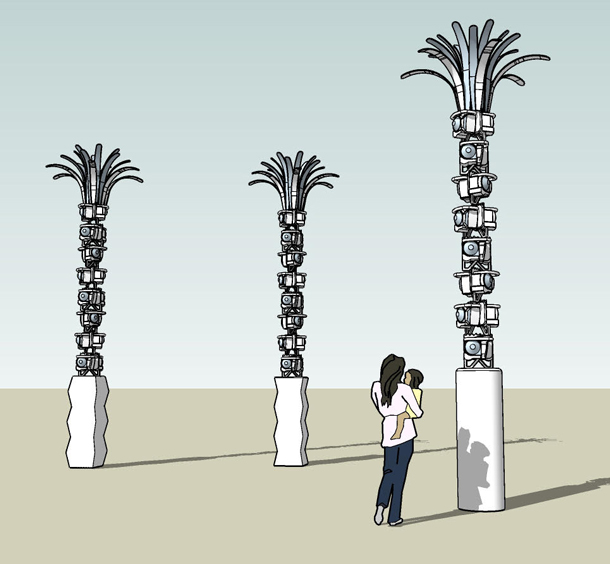
An illustration of what the chainsaw art will look like when completed. (Photo: courtesy of Health in Harmony)
BASCOMB: And what are you doing with all of those chainsaws that you bought?
WEBB: [LAUGHS] Yeah, we're actually, we have an amazing artist who has designed these sculptures, which will look like coconut palms, where we bend the blades, because these blades are very long. These are for cutting down giant, giant rainforest trees. And so we're going to put one in the courtyard of our medical center, and we're going to put one at the national parks office, and we're going to put one at the local university that we partner with, so we're excited about it.
BASCOMB: Oh, that's great. I love it. And what about the health improvements that you've seen?
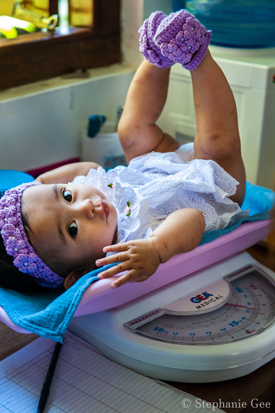
A baby awaits immunization at the ASRI clinic. Infant mortality in the Gunung Palung area has dropped by nearly 70% since Health in Harmony and ASRI started working there in 2007. (Photo: Stephanie Gee)
WEBB: Yeah, so across the board, people are much, much healthier. You know, one of the very, very common reason for people to come into the clinic in the beginning was malaria. We actually in like the last six years haven't seen a single local case of malaria. We have also seen much less diarrhea, I think there's more than a 50% drop. There was a very interesting paper that came out in Science, I think last year, or the year before, where they looked at forest cover all over the world in relation to diarrhea. And the more forest there is, the less diarrhea.
BASCOMB: Yeah, so keeping the forest healthy, you're also keeping the people healthy. And in lots of different ways, it sounds like.
WEBB: Exactly. So there's like this synergistic effect. One of our Board Chair members, Jo Whitehouse, likes to say, one plus one is 11. I think that's really true. And we've seen all these sort of knock on effects that were totally unexpected, like 42% more children finishing grade school. Now, I'm sure the government had something to do with that. But it's also people are better off, their children are not having to stay home and take care of sick parents. You know, there's just all these ways that, suddenly you can send your kids to school. And that's the first thing you want to do when everything is going better.
BASCOMB: Now, many of our listeners have probably heard about deforestation in Borneo and associate it with palm oil and monocultures, you know, pretty large corporations that are buying these products. To what extent do you see, you know, these large operations impacting the forest where you work there?
WEBB: So there is no question that these large companies are a problem. But what's really interesting, there was an article in Science last year that showed that actually in the tropics, 69% of the loss of carbon is just from degradation, which is to say, taking out trees, individual trees. This is small -- we call it small-scale logging, right, but it's not really small scale. Its enormous. So yes, without question, you know, we should be avoiding palm oil, we should be pressing for more sustainable agricultural techniques from these large companies. But if we are not also addressing the needs of individuals, who really don't want to destroy the forest, they just don't have a choice -- then we're missing the boat. And if we miss the boat on saving rainforests, it's game over. Even if the entire world went to alternative energies, but we lost our rainforests, there's no way that we could deal with climate change.
BASCOMB: Yeah.
WEBB: And we just did a study with Stanford, which was looking at national parks across Indonesia, that's going to come out hopefully soon. And what they found, by looking at satellite imagery, was that while logging was dramatically declining, at Gunung Palung, it was actually increasing in national parks across Indonesia. So you know, we're going to lose these forests. And what's so sad to me is that we're losing them not because the people around them want to destroy the forest. They very much want the forest to be there. They just don't really have a choice.
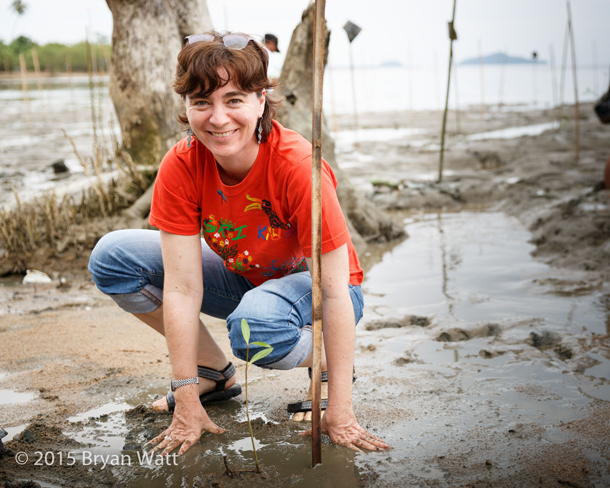
Kinari Webb. (Photo: Bryan Watt)
BASCOMB: And you're giving them a choice.
WEBB: Exactly. We're asking them what the solutions are, and then saying thank you from the world community.
BASCOMB: Kinari Webb is founder of the nonprofit organization Health in Harmony. Thank you so much for taking this time with me and for all of your good work.
WEBB: Thank you so much as well.
Links
Dr. Kinari Webb’s TED talk about Health in Harmony
Paper in Science (2017): Degradation and carbon loss from tropical forests
Living on Earth wants to hear from you!
Living on Earth
62 Calef Highway, Suite 212
Lee, NH 03861
Telephone: 617-287-4121
E-mail: comments@loe.org
Newsletter [Click here]
Donate to Living on Earth!
Living on Earth is an independent media program and relies entirely on contributions from listeners and institutions supporting public service. Please donate now to preserve an independent environmental voice.
NewsletterLiving on Earth offers a weekly delivery of the show's rundown to your mailbox. Sign up for our newsletter today!
 Sailors For The Sea: Be the change you want to sea.
Sailors For The Sea: Be the change you want to sea.
 The Grantham Foundation for the Protection of the Environment: Committed to protecting and improving the health of the global environment.
The Grantham Foundation for the Protection of the Environment: Committed to protecting and improving the health of the global environment.
 Contribute to Living on Earth and receive, as our gift to you, an archival print of one of Mark Seth Lender's extraordinary wildlife photographs. Follow the link to see Mark's current collection of photographs.
Contribute to Living on Earth and receive, as our gift to you, an archival print of one of Mark Seth Lender's extraordinary wildlife photographs. Follow the link to see Mark's current collection of photographs.
 Buy a signed copy of Mark Seth Lender's book Smeagull the Seagull & support Living on Earth
Buy a signed copy of Mark Seth Lender's book Smeagull the Seagull & support Living on Earth

